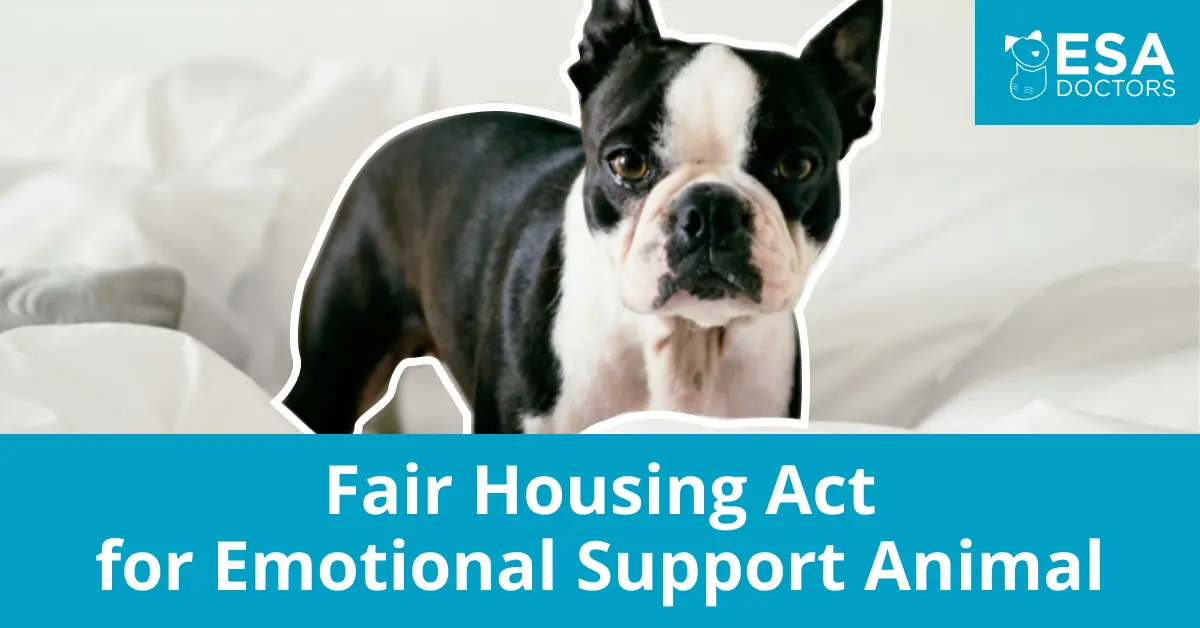This article was last updated on January 26, 2024, to reflect Florida’s latest laws.
Looking to learn about Florida’s emotional support animal laws? This guide will explain the laws and help answer your ESA legal questions in Florida. We keep it up-to-date, so be sure to bookmark this page to stay in the loop.
ESA Rights Under Florida Statute 760.27
Florida’s Emotional Support Animal Statute Section 760.27, as well as federal Fair Housing laws, protects owners of emotional support animals from housing discrimination. These laws give Florida residents the following rights:
- The ability to live in no-pet buildings (including condos, co-ops, HOAs, and rentals) and exemption from no-pet lease provisions (FL Statute 760.27(2)
- Waiver of monthly pet fees, pet deposits, and pet application fees (FL Statute 760.27(2) and HUD FHEO-2020-01)
- Exemption from pet weight and size restrictions (HUD FHEO-2020-01)
- Exemption from building breed restrictions (HUD FHEO-2020-01)
ESA Letter Requirements Under Florida ESA Statute 760.27
Under the Florida ESA statute, Florida residents can prove they need an emotional support animal by getting an ESA letter from a licensed healthcare practitioner (which includes telehealth providers).
The rules in Florida also prevent landlords from creating unnecessary obstacles for tenants who request ESA accommodation. For example, Florida housing providers can’t require the use of a specific form or a notarized document (Florida Statute 760.27(3)). Landlords also cannot deny an ESA request solely because the tenant didn’t follow the landlord’s own procedure for ESA accommodations.
Florida’s ESA rules make clear that in order to have a valid emotional support animal, all you need is an ESA letter from a licensed healthcare practitioner.

Examples of Florida ESA Law Violations
Landlords can face legal consequences for violating the rights of residents with emotional support animals in Florida. Here are a few cases where landlords were brought to court for their failure to comply:
FL Statute 760.27(2): The ability to live in no-pet buildings (including condos, co-ops, HOAs, and rentals).
Landlords who fail to accommodate emotional support animals in Florida can face legal repercussions. One lawsuit was initiated after a Florida resident’s request for an emotional support animal, a 12-pound toy Manchester Terrier named Harrison, was challenged.
The tenant had provided a letter from his physician, veterinarian records for his ESA, and photographs of his ESA. However, the condo’s lawyer requested further documentation and inappropriate details about the tenant’s disability and the necessity of his emotional support animal.
The case eventually resulted in a settlement in which the condo association agreed to fair housing training and confidential monetary relief.
FL Statute 760.27(2) and HUD FHEO-2020-01: Waiver of monthly pet fees, pet deposits, and pet application fees.
Under Florida’s ESA laws, landlords are not permitted to charge any type of pet fee. That includes fines for having a pet, monthly pet fees, pet application fees, and pet deposits. This was illustrated in a case where a non-profit fair housing organization successfully resolved a disability complaint filed with HUD on behalf of a Florida couple, the Johnsons, who faced issues with their condo association in Lauderhill, Florida.
The Johnsons obtained their dog at a time when the condo community was pet-friendly. Later, the condo association passed a no-pet policy. The Johnsons sent a reasonable accommodation request for their emotional support animal to the condo board.
The Johnsons never received a response from the condo, and the association fined them for walking their ESA on the premises. In the end, the fines totaled $1,100 for repeated violations of the condo pet rules.
Following a HUD complaint and investigation by the Broward County Human Rights Section, a settlement was reached. It allowed the couple to walk their ESA on the property, dismissed all fines, and awarded them $10,000 in monetary compensation.
HUD FHEO-2020-01: Exemption from pet weight and size restrictions.
Florida’s ESA laws prevent landlords from enforcing size and weight restrictions on emotional support animals. In one case, a Florida tenant suffering from PTSD successfully sued his condo association for violating federal and Florida Fair Housing Acts by enforcing a pet weight policy against his emotional support dog.
FAQ About Florida ESA Laws
- What privacy rights do I have as an ESA owner in Florida?
Florida Statute Section 760.2 prohibits landlords from requesting: 1. information that details the diagnosis or severity of the tenant’s disability, and 2. any medical records relating to the tenant’s disability. In one Florida case, a tenant had provided a letter from his physician, but the condo’s lawyer requested further documentation and inappropriate details about the tenant’s disability.
The case eventually resulted in a settlement where the condo association agreed to fair housing training and monetary relief without admitting wrongdoing. This case highlights that ESA owners not only have housing rights in Florida, but also a right to privacy regarding sensitive details surrounding their condition.
- Can my Florida landlord require me to use a specific form for my ESA request?
No, Florida Section 760.2(3)(b) prevents landlords from making things difficult for tenants who request ESA accommodation. Housing providers can’t require the use of a specific form or a notarized document. Landlords also cannot deny an ESA request because the tenant did not follow the landlord’s procedure for ESA accommodations.
- Does Florida law require an ESA registration, ID, or certificate?
No, Florida Section 760.2(3)(c) specifically states that registrations, ID cards, or certificates are not sufficient to prove that you have an emotional support animal.
- Can I bring my ESA to a courtroom in Florida?
Yes, in Florida, ESAs are allowed in courtrooms. In November 2022, the Florida Supreme Court adopted rules to allow the use of emotional support animals in courts. Those planning to bring an emotional support animal to court should notify the court in advance.
Does your dog provide emotional support?
Work with a licensed professional to get a legit ESA letter in your state.





Can a rooster be classified as an ESA and am I covered if I live in an area that does not allow roosters and I got the ESA certificate after that complaint was filed?
what about if they have a pet limit policy, example 2 pets allowed, and you have 3 but one is an ESA?
Emotional support animals do not count as pets. They are exempt from pet limit policies.
What about restricting dangerous breeds from condo’s ?
Emotional support animals are exempt from breed restrictions. So even though your condo may have a policy not allowing certain breeds of dogs, it wouldn’t apply to an emotional support dog.